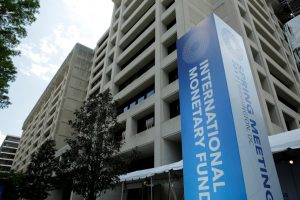By Onome Amuge
The International Monetary Fund (IMF), says policy makers in sub-Saharan Africa have been weighed by difficult choices as they balance keeping inflation in check with a still-fragile recovery amid currency depreciation.
This is as currencies in the continent continue to weaken against the US dollar, heightening inflationary pressures across the region as import prices surge, alongside a growth slowdown.
The IMF stated this in a recent blog post titled “African Currencies are Under Pressure Amid Higher-for-Longer US Interest Rates”.
The global lender, in its assessment of the exchange rate chart of the week, showed that the average depreciation for the region since January 2022 stands at about eight per cent. It also noted that the extent varies by country, with Ghana’s cedi and Sierra Leone’s leone depreciating by more than 45 percent.
“The depreciation across the region were mostly driven by external factors. Lower risk appetite in global markets and interest rate hikes in the United States pushed investors away from the region towards safer and higher paying US treasury bonds,” IMF stated.
The report also noted that foreign exchange earnings took a hit in many countries as demand for the region’s exports dropped as a result of the economic slowdown in major economies. At the same time, high oil and food prices, partly due to Russia’s war in Ukraine, pushed up import costs last year.
Large budget deficits were also identified to have compounded the effects of these external shocks by increasing the demand for foreign exchange. As a result, the global financial institution observed that about half of the countries in the region had deficits exceeding five per cent of gross domestic product in 2022, putting pressure on their exchange rates.
Highlighting the implications, the report noted that when currencies weaken against the US dollar, local prices rise, as much of what people buy, including essential items like food, are imported. It added that more than two-thirds of imports are priced in US dollars for most countries in sub-Saharan Africa.
“Weaker currencies also push up public debt. About 40 percent of public debt is external in sub-Saharan Africa and over 60 percent of that debt is in US dollars for most countries,” the report stated.
The Bretton Wood Institution stated that since the beginning of the pandemic, exchange rate depreciations have contributed to the region’s rise in public debt by about 10 percentage points of GDP on average by end-2022, holding all else equal.
It noted that though many central banks in the region have tried to prop up their currencies by supplying foreign exchange to importers from their reserves, the falling reserve buffers in many countries has left little room to continue intervening in foreign exchange markets.
The article also observed that some countries have applied administrative measures such as foreign exchange rationing or banning foreign currency transactions. It,however, pointed out that these measures can be highly distortive and create opportunities for corruption.
Given that the external shocks are expected to persist, the IMF said countries where exchange rates are not pegged (fixed) to a currency have little choice but to let the exchange rate adjust and tighten monetary policy to fight inflation.
On the other hand, it said countries with pegged exchange rates will need to adjust monetary policy in line with the country of the peg.
In both country groups, the IMF advised that fiscal consolidation can help to rein in external imbalances and limit the increase in debt related to currency depreciation. It also recommended structural reforms to boost growth.











